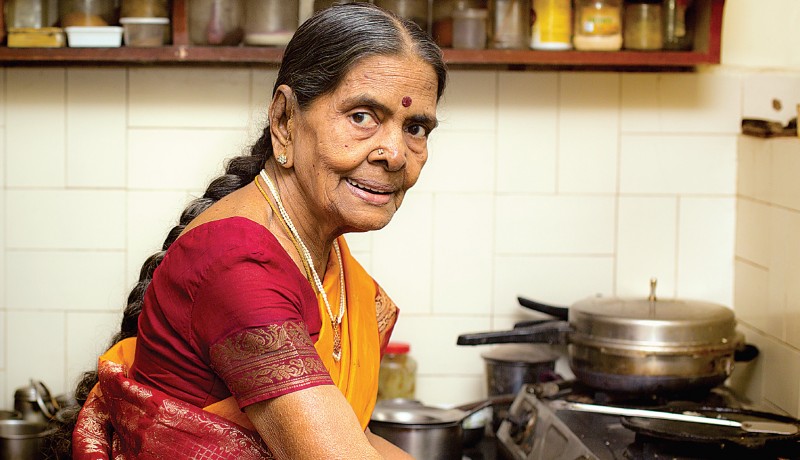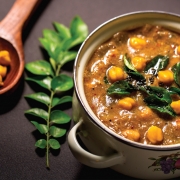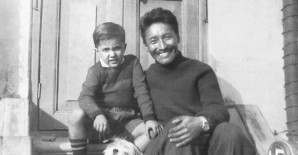
Columns

A series by Pratibha Jain about silvers who believe nurturing the body and mind is the key to joy.
Featuring Rajalakshmi Sampath from Chennai
The more I admire my friends, the more I want to meet their parents. This curiosity often stems from their underlying presence in many of our conversations. They are mentioned when we are discussing traits or habits or even likes and dislikes. And they are invariably referred to when discussing food and our own relationships with our children. It is this curiosity that landed me at the residence of Smt Rajalakshmi Sampath, my friend Meera Srikant’s mother. I admire Meera for her wonderful set of values: self-reliance, dedication to the arts, love for cooking, inculcating responsibility in her children, and being unscrupulously honest and sincere.
Having a chat with Meera’s parents just explained it all! At 74, Smt Rajalakshmi still manages all the housework on her own. She enjoys Carnatic music, plays Sudoku, and cooks like a dream. She is extremely simple, quiet, and disciplined. We met at her home in T Nagar, Chennai, and chatted about relationships, adjustment and values, while I munched on a plate of her delicious bhakshanam (snacks).
IN HER OWN WORDS
Both my husband Sampath and I grew up in Chennai. We lived fairly close to each other and even attended the same school but, no, it was not a love marriage. In those days, we did not even think of such things. We were too obedient as children. I studied up to SSLC, then got married in 1961. After marriage, we lived mostly in the north: in Mumbai; two stints in Kolkata; Delhi; followed by Madurai; and finally Chennai. Before marriage, I never had to do any housework or even help in the kitchen. It was in Kolkata that I learnt these life skills, as there was no one to help me. It was there that I learnt cooking, housekeeping, and living on a budget.
In our time, we lived a life with defined restrictions. People planned budgets and lived within their means. We shopped at the right places and knew how to bargain. In fact, my daughter Meera always gets embarrassed because I enjoy bargaining! But I think it is important to have these skills. Actually, most of my relatives appreciate my talent for shopping and getting things at the right price. In those days, we knew how to stretch our provisions for months. We never wasted anything. In fact, I used to sew the children’s clothes and my own dresses myself. But now, things are available easily and aplenty. People’s priorities and values have changed a lot over generations.
SELF-RELIANCE
We are a family of Tamil Brahmins. After getting married, I always did the housework and prepared meals for my family myself. Once in a while, we would have some help, but I have mostly managed alone. By planning my daily routine, I was able to make time for activities I enjoy. Even now, I keep my mind active with many things. I have been teaching Carnatic music since 1979. Today, I teach at home and online via Skype. I also enjoy doing Sudoku and online cryptograms. I can make time for all of these because I plan in advance and do not keep much work pending. I am also meticulous about stocking the kitchen. To this day, I cook simple, traditional meals and make fresh food every day. We do not make excess food or use leftovers the next day.
Meera (daughter): I follow Amma’s policy of being self-reliant. This also teaches the children to pitch in. My children are involved in all the housework. But that is where Amma is different. She never asked us to help. In fact, even now, she doesn’t. She will work in silence, but neither complain nor ask for help. She never lets mental or physical fatigue consume her, nor does she ever get hassled.
INHERITING FAMILY VALUES
Children grow by watching their elders. It’s not about what you tell them, it’s about what they see you do. I admire them for their power of observation. Children today are so much smarter and more observant than we were at their age. We don’t even realise how keenly they observe all that we do. I was trained in Carnatic music from childhood. My mother was very strict and made my niece and me practice every single day without fail. Growing up, I had a very mild voice. I remember how desperately I wanted to overcome my weakness, so I would practise even harder. I have had the privilege of singing for dancers such as Sonal Mansingh, and Radha and Raja Reddy. As for my husband, he was a Customs officer but he has always been passionate about learning languages as well as Carnatic music. He is a multi-linguist and a very good singer himself, keenly interested in the theoretical aspects of Carnatic music. He has composed songs that have been released in book form as well as CD.
Our children [two sons and a daughter] have inherited our love for music and arts and encourage their children to appreciate them too. Our grandchildren also have an avid interest in classical arts and an aptitude for languages. Even our granddaughter, Vasudha, who is just 16, can write in chaste English and Hindi.
Sampath (husband): We lived in various metros, so it was easy to pick up languages. I was always interested in languages. Even in school, I never skipped the language classes. I still remember, at work, colleagues could never guess my origin from the way I spoke. Each one always thought I was a native of that region.
Meera: Yes, and he was very proud of it! It used to create problems for Amma though. Whenever she would sing a song in any regional language, he would correct her! After retiring as additional collector, Central Excise, Chennai, in 1996, he has undertaken translation work for religious organisations. He also worked at Ananda Vikatan in 2006, as part of a team translating the Britannica Concise Encyclopaedia into Tamil; he contributed significantly to the project.
SIGNATURE DISH
The children and grandchildren eat and enjoy everything I cook, so I really don’t know what their favourite dishes are. But what I do know is that the most-reached-for vessels in my house are the ones where I keep the bhakshanam [snacks, munchies]! Our cuisine has so many delicious varieties of them. To name a few: thattai, seedai, murukku and mixture are some of the savoury varieties and peanut barfi, Mysore pak and diamond cuts among the sweet ones. I prepare all these at home and store them in air-tight containers. Most of them stay good for weeks. In fact, I make sure to only keep a limited quantity outside when the children come; otherwise it doesn’t matter how many batches I make, it gets eaten all at once! The grandchildren are always trying to find where I hide the remaining stock.
Meera: That’s true. My son Ashwath loves coming here to eat Amma’s food. Once, he saw her preparing Mysore pak and must have seen how effortlessly she prepared it. A few days later, he couldn’t find anything interesting to munch on at home. So he turned to me and said, ‘Why don’t you make something? Make at least Mysore pak!’ The truth is, he didn’t realise making Mysore pak requires immense skill and perfect timing.
KEEPING CREATIVITY ALIVE
I don’t know whether it is being creative or not, but I am always experimenting with new vegetables and ingredients. Despite living in so many different cities in India, I have stuck to some traditional rules such as cooking without onion and garlic. But I keep making modifications and innovations when I see different vegetables and for health reasons too. For instance, drink this glass of kadarangai juice. It’s a variety of bitter lemon. I simply experimented with it by soaking chopped pieces along with rock salt. I stirred it for two days and then refrigerated it. The liquid goes on collecting at the bottom of the jar and serves as the concentrate for the juice.
PULI KOOTU
A southern Indian dal with chickpeas
A healthy and sumptuous dish, this family favourite in Smt Rajalakshmi’s home is made with an unusual combination of pumpkin with chickpeas.
Ingredients
- Chickpeas (dried chole): ¼ cup
- White pumpkin: 1 cup; chopped
- Tamarind: Lemon-sized
- Turmeric powder: ¼ tsp
- Mustard seeds: ¼ tsp
- Oil: 1 tbsp
- Curry leaves
- Salt to taste
For the masala paste
- Channa dal: 2 tsp
- Urad dal: 2 tsp
- Peppercorns: 2-4
- Red chillies: 2
- Asafoetida powder: A pinch
- Grated coconut: 2 tbsp
Method
Soak the chickpeas overnight. The next morning, pressure-cook and set aside. Soak the tamarind in enough water and extract the pulp. Cook the chopped pumpkin in enough water and set aside.
For the masala paste, heat 1 tsp oil in a pan. Add the asafoetida, channa dal, urad dal, peppercorns and red chillies. Roast until the dal turns golden. Now, add the grated coconut and grind into a fine paste, adding enough water. In the same pan, cook the tamarind pulp and chopped pumpkin in a cup of water. Add salt, turmeric powder and the masala paste. Cook for a few minutes and add the cooked Chickpeas. Bring to a boil and lower the flame. Allow the kootu to simmer for a few minutes and switch off the flame. In another small pan, heat the remaining oil and pop the mustard seeds. Add the curry leaves and pour this tempering over the kootu. Serve hot with steamed rice.
Tips: You can make this kootu with other lentils such as red channa, dried green peas and dried karamani (lobiya/black-eyed peas). Among these, karamani does not require overnight soaking. You can also substitute pumpkin with chow chow or brinjal. Further, you can add a teaspoon of rice powder to thicken the kootu if you wish.
Pratibha Jain, an author and translator from Chennai, is the co-author of two award-winning books Cooking at Home with Pedatha and Sukham Ayu. Her area of specialisation is documenting Indian traditions through research, translation and writing
Photos: D Kalaiarasan Featured in Harmony — Celebrate Age Magazine December 2017
you may also like to read
-
Mental workout
Mukul Sharma tells you how to keep those grey cells ticking Everyone will ultimately lose his or her brain….
-
Helpline
Dr Harshbir Rana answers your queries on personal and social issues related to ageing, elder care and intergenerational relationships ….
-
Off the cuff
Raju Mukherji pays tribute to his first hero, Tenzing Norgay, an exemplary mountaineer Darjeeling, 1955. Dr ‘Pahari’ Guha Mazumdar….
-
Yoga RX
Shameem Akthar shows ways to control debilitating ankle pain through regular practice Ankle pain is so common and prevalent….








